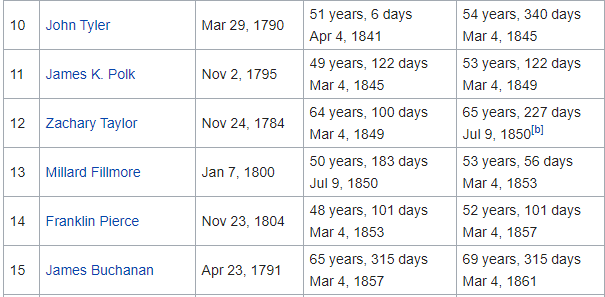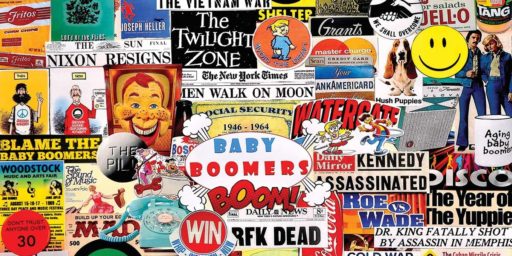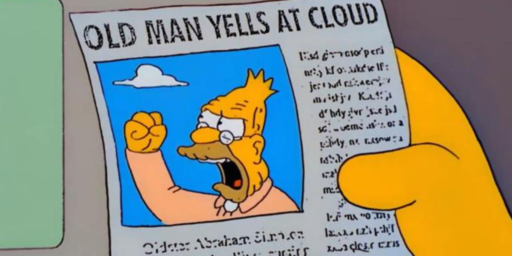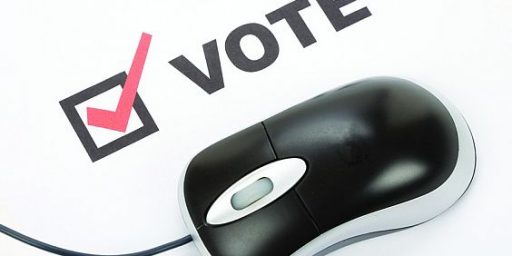Presidential Generations
We're going to make history one way or another in November.

Catching up on my reading at Dave Schuler’s place, a discussion of a paywalled column about why under-30s support Bernie Sanders immediately spun into one of what the generations have wrought.
Regular Glittering Eye and OTB commenter @Andy observes,
I think [the under-30s] are angry, justifiably so, that previous generations are leaving them with a big pile of dung to clean up. The only future the Boomers and Silents have a stake in is ensuring the house of cards they’ve built doesn’t collapse until after they are dead.
To which @Dave replies,
What “house of cards” have Baby Boomers built? To the best of my knowledge the Congressional leadership has either been composed of Lost Generation, Greatest Generation, or Silent Generation since the Baby Boomers have been old enough to vote. The present leadership is almost entirely Silent Generation. The leading Democratic presidential candidates are all Silent Generation.
I think the complaint that Baby Boomers didn’t fix the mess they have been consigned is a fair cop but not that they created it.
I commented briefly there but will expand on it substantially here.
The Lost Generation, a term coined by Gertrude Stein, describes those born between 1883 and 1900 whose formative experiences were World War I and the Roaring Twenties. They’ve all been dead for a while now.
The Greatest Generation, a term coined by Tom Brokaw to describe the cohort who fought the Great Depression and World War II, were born between 1901 and 1927. None of them are currently in national government. (Don Young of Alaska, the oldest current member of either House of Congress, was born in 1933.)
They were followed by the Silent Generation (1928-1945), Baby Boomers (1946-1964), Generation X (1965-1979), Millenials (1980-1996), and Generation Z (1997-mid 2010s), and Generation Alpha (indeterminate).*
My parents, both born in 1943 and both now passed, were Silents. I was born in 1965 and thus at the front end of Gen X. My girls were born in 2008 and 2011 and are thus Gen Z. So are my considerably-older stepchildren, born in 1999, 2000, and 2004.
In terms of our current governance, President Trump (1946) is a Boomer, Speaker Pelosi (1940) and Leader McConnell (1942) are Silents.
The contenders to face Trump in November are Bernie Sanders (1941), Joe Biden (1942), Mike Bloomberg (1942)—all Silents; Boomers Elizabeth Warren (1949) and Amy Klobuchar (1959); and Millenial Pete Buttigieg (1983).
But here’s what’s weird: We had our first Boomer President, Bill Clinton (1946), as a result of the 1992 election. He took office 27 years ago last month. He was followed by another Boomer in George W. Bush (1946). And another in Barack Obama (1961). And yet another in Donald Trump (1946).
Not only is that four Boomers in a row but three of them were born within two months of each other in 1946. They were first elected 24 years apart. And in reverse birth order.
Clinton was the second-youngest President ever elected at 46. Trump was the oldest.
Eight months out, Trump has pretty fair odds of breaking his own record. And the frontrunner for the Democratic nomination is five years older!
It’s not at all inconceivable that we’ll go from four Boomers in a row to a Silent. We’ve never done anything like that before. Certainly, we’ve had many instances where a President of one generation is replaced by one from the previous generation. But those were cases of 50-somethings handing off to 60-somethings.
It’s quite likely that the President elected this November, 28 years after Bill Clinton’s election, will be older than Clinton is today.
There’s also a chance that we have a fifth Boomer in a row, which would almost certainly be unprecedented. The “Generations” concept is relatively new. The only sequence where we have five different Presidents sequentially born within 15 years or so of one another was this one:

That’s six Presidents in a row born within a 16-year span. But they were inaugurated within a period of only 16 years. They were all one-term Presidents and, indeed, poor Zachary Taylor died in office. By contrast, Clinton, Bush, and Obama were two-termers and Trump could well be.
At the other extreme, it’s not totally inconceivable Buttigieg wins the nomination and beats Trump. In which case, we’d not only have our first Millenial President but we’d skip my generation entirely.
__________________
*I see from Dave’s response to my brief comment there that he defines “generations” unconventionally, and doesn’t consider either Clinton or Trump as representative of that cohort. I find the Generations concept problematic for a similar reason. While I’m Gen X and definitely not a Boomer attitudinally, I really don’t have all that much common with those at the tail end of my nominal cohort, who seem more like Millenials to me. Still, if we’re going to use the construct, I prefer sticking with standard definitions.






Dr. Joyner,
It’s hard for me to think that I or Buttigieg are Millenials. Someone born in 1990 has a better claim to being a digital native than one born from 1980.
I went to a psychologist for some testing late last year, and we discussed this exact subject. He is firmly Gen X–I’m guessing within a couple years of your age. I commented that Gen Xers see me as a Millenial, but Millenials see me as Gen X. He shocked me by saying he saw me as Gen X.
I think part of it is that rapid technological change–specifically changes that cause structural evolution–result in shortened generations. As those changes become the norm, the frames of generations widen again absent another structural change.
To almost every person who has ever lived, the notion of traveling 100s of miles in a day (or 1000s by air) would be utterly incomprehensible. To a portion of a generation, the concept may induce wonder, but is thinkable. For everyone after that, it’s routine.
@Kurtz: For early Xers like me, the Iran hostage crisis, Reagan, the Challenger explosion, and fall of the Berlin Wall are formative. But those are dim memories at best if you’re born in 1979. For them 9/11 was formative whereas I was 30.
My 8-year-old daughter and 20-year-old stepdaughter have little in common. But they’re nominally both Gen Z.
@James Joyner:
I was born in 1968 and agree with all of that.
For context on the post at Dave’s place, this is an old disagreement between us. Whenever criticism of the Boomers comes up he consistently points the House and Senate leadership and, IMO, minimizes the influence Boomers have had on the direction of the country, particularly in the last 2-3 decades.
I know it’s pissing into the wind, but criticizing the youngest generations is a pet peeve of mine. Boomers and Silents complained about us Gen-Xers and now a lot of us complain about Millenials and Gen-Z. And I’m sure Millenials and Gen-Z will complain about the youngsters once they get into their 40’s.
I’m a Boomer, 1954, and I quite like the Millennials. They’re kinder than we were. They’re freer than we were.
It would be easy to laugh at what looks like weakness, for example, the outrage among Millennials at how Amazon treats warehouse workers. They have to walk miles, always at a fast pace, perform complex tasks at speed and at the end of the day they’re sore and exhausted. And how is that different from any average Saturday as a waiter?
But why would I think waiting tables in the 80’s should be a model for how workers today are treated? I haven’t hefted a tray in 30 years and my back is still messed up. I’m glad the yutes are pushing for a kinder, gentler world. I hope they bring back unions, we’ve seen what the working man’s lot is without unions.
It’s funny but I never considered Obama a Boomer. I think of Boomers (like me, 1954) as having their fundamental formative experience to be Vietnam and the 60s and all that entails. I always have felt that once we had Obama we should never go backwards. And yet here we are.
The 2016 election depressed me because we had a choice between Trump and Clinton. Now it is going to be between Trump and quite possibly even older. Sorry, we need to get off the stage. I’d be quite happy with either Klobuchar or Buttigieg.
As for the initial question. What is the under 30 (even under 35) crowd being offered in this election. They see debt being added at an increasing pace. Any solutions (using in the form of cutting the social safety net) will be put on their back, not the generations that are currently soaking up the government goods and services. And they’re asking why.
In early 2016 I saw a graphic (which I can no longer find) that went as follows:
No matter who you vote for will be making history.
Hillary Clinton: First woman president
Bernie Sanders: First Jewish president
Marco Rubio: First Latino president
Ted Cruz: First Canadian president
Donald Trump: Last American president
@Scott:
I’ve discussed this before here, but the silliness and arbitrariness of the divisions in these official generational groups reflects how the terms evolved. None of these terms, individually, acquired broad usage until the members of the generation in question had lived long enough that people felt they could make (often absurd) generalizations about them, but the divisions of one generation shifted with the definitions of whatever followed. The Baby Boom that gave the generation its name probably should be thought of as going no later than the mid-1950s. The reason it’s extended to the mid-1960’s has to do with how the next generation was coined. Just like with the boomers, people didn’t start to talk about Gen-X until decades later, when the original Gen-Xers were already adults (note that Billy Idol’s old band bears the name despite the fact that Idol, like most of the first-wave punks, was a boomer born in the ’50s), and then the generation was marked as beginning in 1965, so anyone born before that point in that decade was sort of grandfathered in (so to speak) to the boomers.
The same was true of millennials. That term took quite a while to catch on, and there was a period when people born in the ’80s were being called Gen-Y. And people are now quite fuzzy about where the millennial generation ends–I’ve seen people apply the term to those born in the 21st century, under the notion that we’re still somehow in that generation now. The term “Gen-Z” has been used to describe the post-millennials (which depending on where you look may begin as early as 1996), but given how temporary the term “Gen-Y” proved to be, I wouldn’t be surprised if it ultimately gets set aside for some different term.
Yes, arguably using generational terms as short-hand for a particular attitude or shared values is a bit easier when that generation is older. I suppose it’s possible to argue that many 55 – 75 year old Boomers share certain things in common (adult kids, grandkids, more likely to have disposable income), but the term “millenial” is currently useless. It’s used as shorthand for “urban, woke, recent grad, living in shared apartments and Tinder-ing around”, but the term technically also encompasses the 39-year old soccer mom who lives in a detached house in the burbs, driving her three elementary school-aged kids around in a Volvo SUV. It’s a word that just doesnt mean what people think it means
Also, the fact that the top 3 prospects for the Dem nomination are Silents in their late 70s, after 27 consecutive years of Boomer presidents, is completely crazy.